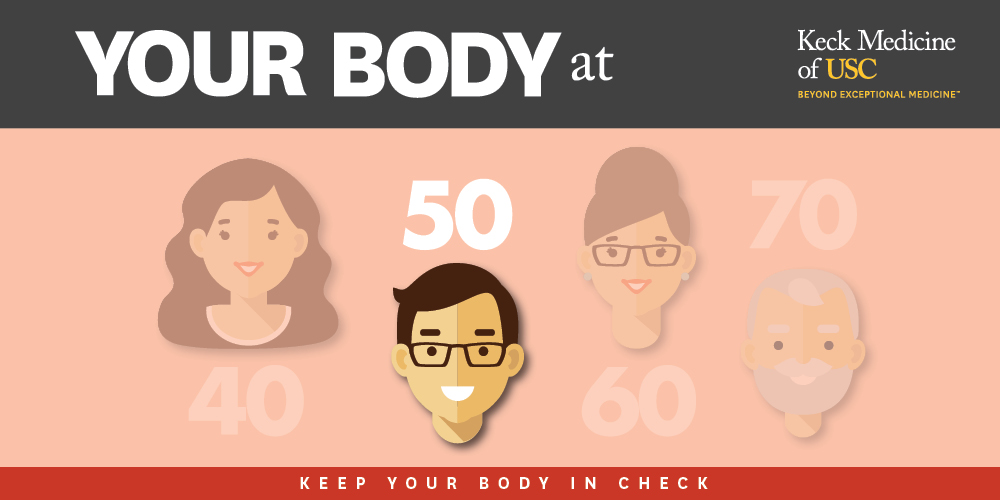
Your 50s might bring some changes in your body — here’s how to handle what’s in store.
We’ve all heard that 50 is the new 40. Maybe it’s because many 50-somethings are just as active as 40-somethings. Whatever the case, yes, you’re older, but you’re also wiser: You don’t sweat the small stuff (although you may sweat the hot flashes!). Here’s what to expect in your 50s.
You’ll hit a new milestone
What to expect: The start and end of menstruation mark huge physical and emotional milestones in a woman’s life. Although your cycle might have been wonky for years, sometime after 50 it will cease altogether (if it hasn’t already).
What can help: Changing levels of estrogen in your body can wreak unpleasant side effects like hot flashes, night sweats, vaginal dryness, sleep issues and anxiety. You can limit hot flashes by dressing in layers, keeping your house cool and avoiding alcohol; and don’t worry, they don’t last forever. Vaginal estrogen that comes in creams, tablets or rings can help with vaginal dryness and make sex more comfortable. Talk to your doctor about hormone replacement therapy (HRT) to see if it’s right for you. Also, protect against postmenopausal bone loss with calcium in your diet or with supplements (as well as vitamin D to help absorb it) and weight-bearing exercises.
ED might become part of your vocabulary
What to expect: Women aren’t the only ones who experience sexual changes in their 50s. Men may find it harder to get and keep an erection during sex. Although erectile dysfunction (ED) affects about 30 million men in the United States, it’s not a “normal” part of aging, even though older men are more likely to experience it. ED can be caused by a physical problem related to blood flow or certain conditions like diabetes, high cholesterol and high blood pressure. Some medications can also cause ED. Be sure to tell your doctor about it in case it’s a symptom of a larger issue.
What can help: Medical treatment is available, but you can also reduce or improve your ED by quitting smoking, limiting alcohol, getting exercise and maintaining a healthy weight.

You’ll need to pay attention to heart health
What to expect: If the pounds creep on as you enter your 50s, especially around the middle, it can become a particular problem for your cardiovascular health. For postmenopausal women, a decline in estrogen may also increase the risk of heart disease.
“As we get older, the risk of experiencing a heart attack increases,” says Antreas Hindoyan, MD, a cardiologist at Keck Medicine of USC and assistant professor of clinical medicine at the Keck School of Medicine of USC. “According to the American Heart Association, 6.3% of men and 5.6% of women between the ages of 40 and 59 have coronary artery disease, which raises the risk for heart attack. In this same age group, 3.3% of men and 1.8% of women experience a heart attack.”
What can help: Although age is not a risk factor you can control, there are other risk factors for heart disease that you can address.
“A combination of a healthy diet and routine exercise is what we prescribe to our patients for reducing their risk of coronary artery disease,” Hindoyan says. “I can’t extol the benefits of cardiovascular exercise enough. Ideally, people should partake in 30 minutes of moderate-intensity cardiovascular activity, such as walking five times a week, or 25 minutes of vigorous cardiovascular activity at least three times a week.”
You might have to work harder to maintain muscle
What to expect: Another reason to start or continue an exercise regimen is to combat muscle loss that can come with aging. For men, this loss may also be affected by a decline in testosterone.
What can help: Resistance and strength training can help pump up your muscles; and eating enough protein will help your body build it. Just go easy on red and processed meats, which have unhealthy saturated fat.
Topics
